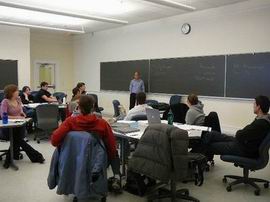Problem Based Learning
Solar Hydrogen Course
The course was the first interdisciplinary course developed for the IGERT program. There have been courses that the IGERT students had to register for, but this course in particular was developed for the IGERT students and the program. The IGERT strives to develop graduate students that have a completely different graduate experience. In this regard we have focused on making the students very pro-active in their involvement with community outreach projects (as you've already seen and heard about) and give them a slightly different educational experience. Even though they are here for research purposes, they are also here to work together in interdisciplinary teams so that they can collaborate on different group projects, and essentially publish papers that are interdisciplinary in nature.
Other educational focuses of the IGERT is that we have provided the students with Skills for Success courses which enable them to develop their interpersonal skills. During winter session, the students attended a 'Develop a 30 second commercial' seminar in which they figured out ways to sell themselves to potential employees. This was run by Joyce Henderson at Career Services. David Kmiec also enlightened the students on technical writing skills and received great reviews for his role. The IGERT students also attended the Ethics workshop hosted by the University of Delaware to fulfill these criteria of their skills for success courses.
In terms of the Problem Based Learning Solar Hydrogen Course (ELEG/MSEG 667-013)… Myself, Meghan Schulz (our TA), Professor Opila and Professor Watson planned and created the course. The course itself was titled as: Solar Hydrogen Systems in Renewable Energy and looked at topics relating to solar hydrogen relating to the generation and use of hydrogen from solar energy sources, particularly photovoltaics and photo-electrochemical systems. The course includes: technical analyses of energy payback, applications of solar hydrogen systems: energy efficiency analysis of hydrogen systems; economics and policy. This course is heavily project based, with students expected to complete several group projects.
Working alongside George Watson (ITUE) we developed a course that took into consideration the following learning and process objectives:
Learning Objectives:
- Understand the broad framework of solar and hydrogen energy systems
- Design solutions to the sustainability problem incorporating solar power and hydrogen fuel
- Learn to effectively use policy as a tool for positive change
Process Objectives:
- Make decisions based on critical evaluation of evidence
- Learn to work effectively on interdisciplinary teams to solve complex problems
- Communicate recommendations to the public
During this course the IGERT students, who come from 7 different disciplines, were assigned groups of 5. The groups were interdisciplinary and they were given a range of different problems pertaining to solar hydrogen that were relevant and existed in 'real time'.
The first problem they were asked to think of themselves as energy experts for the first 100 days of the Obama administration. They were asked to think of ways to seek vigorous approaches for reducing carbon dioxide emissions by seven billion tons per year. Embedded in an introduction to PBL, the students then had to prepare a 5 minute presentation on this and 'present' their findings to a team of experts/congressmen. The team of congressmen consisted of Professor Opila (Materials Science), Professor John Byrnes (CEEP) and Professor Allen Barnett (ECE). The students were then questioned by the panel.
1. Obama Administration
2. Student White Papers
3. Student Obama Presentations
The second problem asked them to look at 'A Solar Hydrogen transportation Solution' in which they looked at how General Motors is planning to market the Chevy Volt in late 2010. The idea behind this is that it is planned to be a zero-emissions card. The class represented a team drawn from both GM and MichCon/Detroit Edison energy utilities. Their assignment was to help design the H-Colt and associated infrastructure, with the goal of deploying a test fleet of H-Volts in Michigan within ten years. Professor Ajay Prasad and Professor Suresh Advani offered to be members of the expert GM panel and judged the student's final presentations and feasibility. Professor Prasad also provided the students with a talk on Fuel Cells in order to promote better understanding.
4. Fuel Cell Talk
5. Second Problem Phase 1 and Phase 2
Phase 1 Clean Car Breakthroughs - hope or hype?
Phase 2: A Solar Hydrogen Transportation Solution
6. Student Presentation for Phase 2
The final problems presented to the groups looked at hydrogen problems on a larger scale. The different groups are looking at different problems:
These are the final presentations and the students had to create both a written report and present their findings during the final day of class to members of the IGERT team.
11. Role of Hydrogen for Cameroon
12. Hawaii
13. Offsetting Renewable Energy Intermittency in Delaware through H2 and V2G-based Energy Storage
14. Sustainable Green
The course also spanned across 6 days in total and the students were assessed in a variety of ways:
- Their ability to work in groups
- Presentations
- Written reports
Throughout the course we made a concerted effort to include experts in the various fields and used the resources that were on offer at the University of Delaware as well. Different faculty were judges and gave presentations on content to the students. The idea was to truly make it interdisciplinary and accommodating.
Mo Bremner
IGERT Program Coordinator

Click here to view images
|
